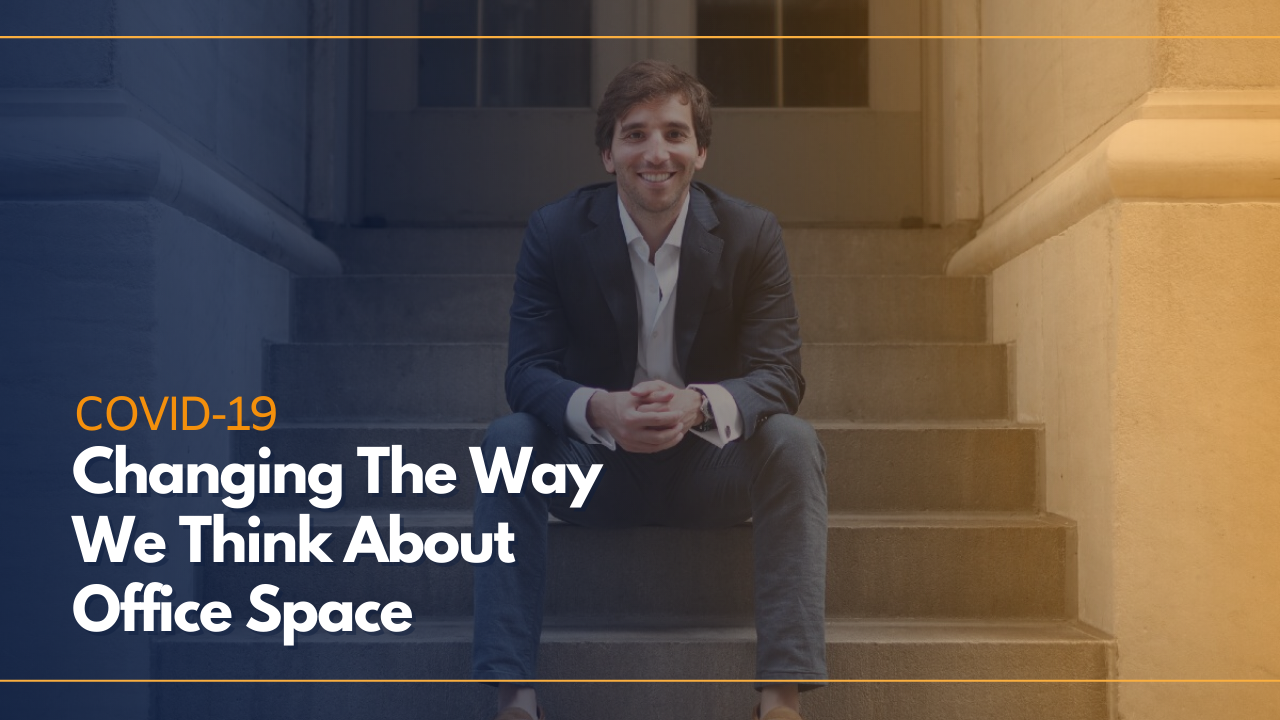- “People are waking up to the tense realities of the old way of doing things and aspiring to build a better way forward”
- SquareFoot’s Jonathan Wasserstrum discusses how COVID-19 is changing the way we think about office space.
- Past norms of the industry are being questioned and rethought at a faster rate than ever before.
By Jonathan Wasserstrum, Founder and CEO of SquareFoot.
We aren’t even out of quarantine yet here in NYC but we’ve already begun to see a sizable shift in how people are thinking about the future of commercial real estate. Some of these changes were already in order, or in action, and have merely been accelerated by a pandemic that’s left so much uncertainty and devastating economic impact.
Over past years, we’ve witnessed landlords becoming more open-minded to the possibility for more flexibility when it comes to divvying up floors in their buildings or assigning specific terms for leases. These conversations and negotiations have long been dictated by the wills of landlords; those who are more open and willing to discuss would build up a reputation and then get the business from tenants who sought flexibility first on their list of needs.
But with COVID-19, we are seeing something change already. Landlords are for the first time coming to us at SquareFoot, the commercial real estate company I founded and lead, to find out how we can help them fill their spaces.
“People are waking up to the tense realities of the old way of doing things and aspiring to build a better way forward”
Jonathan Wasserstrum, SquareFoot
Past norms of the industry are being questioned and rethought at a faster rate than ever before. They want stable, reliable tenants to move in and to stay, but the means to uncover and to procure them has evolved. A perceived power imbalance that once told growing companies to ‘deal with it’ is now transforming into a more level and even-handed discussion between those with office space to rent and those seeking to secure it.
So while flexibility has long been a coveted idea, it was hard to come by. We are already seeing, in the wake of this pandemic and its aftermath, that people are waking up to the tense realities of the old way of doing things and aspiring to build a better way forward.
The flexibility that landlords can, and will provide, is unprecedented. It stems from years of seeing the success of coworking companies, among other office space solutions available in the market. I know at SquareFoot, for example, we’ve heard a louder call over the past year for our own creative solutions to traditional office space, in the form of both FLEX, which we launched, and PivotDesk, which we acquired. Neither of these business initiatives was established because of the threat of a pandemic, however we know from past and present conversations with entrepreneurs that they are turning to tenant representatives to resolve once and for all the long-standing issues they’ve encountered when trying to find the right office space, at the right price, with the right term attached to it. With so many other areas of their businesses operating in the modern era, it’s a wonder to them why commercial real estate has still functioned, for the most part, in a bygone era.
Remote-Only is Not Yet Viable
Although those are recorded and registered complaints prior to this pandemic, a new discussion as it relates to office space has cropped up in recent weeks. As people have grown comfortable working from home, a move to remote-only companies (or roles) is not yet a viable threat to commercial landlords.
What’s clear, though, is that people, especially parents of young children, have adjusted to and are enjoying the work-life balance that they’re experiencing arguably for the first time; they’ll look to, at the end of this, settle with their managers on a plan to work remotely one or two days a week, keeping them at home with loved ones, or will rethink their working hours to be home in time to prepare dinner. Managers would be wise to grant these kinds of requests if they wish to maintain or to develop reputations for being family-friendly and compassionate employers.
What these accommodations will mean for the real estate world is yet to be seen, but a safe assumption is that office spaces will be considerably less full on a fairly regular basis.
Outdated and Misguided
If you think about how we already work, and the various departments and their accompanying expectations, it’s actually quite rare that every person is in the office at any given moment. If they are, how many of them are camped out at their desks working diligently on an assignment to be able to clock out at precisely 5pm? This style of work is notably outdated and, if you were to implement it today, terribly misguided.
People tend to move around the office, especially in the afternoon, choosing alternative seating to mix things up and to gain a fresh perspective, even if they’re still seated alone. So, with more people looking to work from elsewhere on a regular basis, and fewer people at one time in the office, you can fully expect that companies will budget for office space in different ways than they might have in the immediate past.
A company of 50 people might never have all 50 of their employees in the office at once, even if they all call the same city home. Company executives would be wise instead to think about taking on a smaller space, to fit, say, 35 people at a time, and then designating pods of desks to various teams to share together. On a rare occasion where everyone is in the office, you can get by with some couches and bar stools. People will understand because flexibility in their schedules comes with the acceptance that flexibility in their space should follow.
This type of plan comes with consistency and cohesion, and can save a company significant money purely on a square-foot basis. Perhaps more importantly, though, it sends the right message to employees that their needs come first. In a situation like this one, as long as everyone from landlords to managers to junior staffers agree to the principles and plans, everyone wins and gets what they’d want.
We anticipate more creativity in how people think about the office spaces they really want. As more people get a say in the best situation for success, office spaces should also begin to feel unique and different from one another. Build deliberately for the workforce you have — and that you hope to keep happy.
Jonathan Wasserstrum is the founder and CEO of SquareFoot, a commercial real estate brokerage that combines technology with transparent service to make it easy to search for the perfect office.



 Dr. Gleb Tsipursky – The Office Whisperer
Dr. Gleb Tsipursky – The Office Whisperer Nirit Cohen – WorkFutures
Nirit Cohen – WorkFutures Angela Howard – Culture Expert
Angela Howard – Culture Expert Drew Jones – Design & Innovation
Drew Jones – Design & Innovation Jonathan Price – CRE & Flex Expert
Jonathan Price – CRE & Flex Expert












